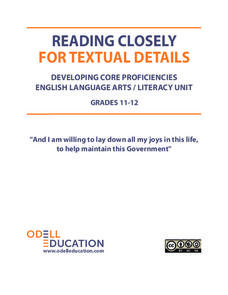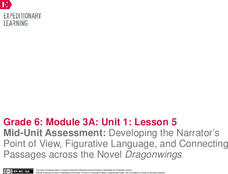Reed Novel Studies
My Side of The Mountain: Novel Study
Some money, a pocketknife, a ball of cord, and some flint and steel ... is that enough for a 14-year-old to survive alone in the wilderness? Scholars explore the topic of survival with the novel study for My Side of the Mountain....
Reed Novel Studies
Of Mice and Men: Novel Study
Why is personification such a popular literary device for many authors? Learners answer the question as they engage in activities from the novel study for the classic Of Mice and Men. They also scan the novel to find examples of the...
Joel Michel Studies
The Tale of Despereaux: Novel Study
What kind of mouse is Despereaux Tilling ... a field mouse? A white-footed mouse? With the novel study for The Tale of Despereaux by Kate DiCamillo, scholars research the different species of mice and draw pictures of the one that they...
Reed Novel Studies
The Summer of Riley: Novel Study
The Labrador retriever is America's most popular dog breed. With the novel study for The Summer of Riley by Eve Bunting, scholars learn more about the sweet, lovable animal. Additionally, they write quatrain poems, explore foreshadowing...
Howard Hughes Medical Institute
Biochemistry and Cell Signaling Pathway of the Mc1r Gene
How do mice have so much fur color variation over generations? Scholars illustrate protein structures based on amino acid sequences. Then, they analyze the signaling pathway in different-colored mice populations. This allows them to...
Howard Hughes Medical Institute
Color Variation Over Time in Rock Pocket Mouse Populations
While many mutations are neutral, those that appear advantageous increase in frequency in a population. Scholars use illustrations to make predictions about populations of mice. They follow it up with a video to confirm or refute their...
Museum of New Zealand Te Papa Tongarewa
Te Reo Maori Activity Book
Introduce young explorers to the language of New Zealand's Maori with an activity book that includes word searches, fill-in-the-blank activities with Maori words, and prompts to illustrate native New Zealand birds.
US National Archives
WWII: Western Europe 1939-45 – Resistance and SOE
Germany seemed to be unstoppable in the early years of World War II, but the tireless and sacrificial work of the Special Operations Executive (SOE) helped to steer the war in another direction. After exploring primary source documents,...
Howard Hughes Medical Institute
Climate and Earth Systems
The components of the atmosphere have a significant impact on long-term climate change. Learners begin by analyzing the role of carbon dioxide in the earth systems and how varying the levels would affect those systems—and ultimately...
EngageNY
Comparing and Contrasting Two Texts about Poison Dart Frogs: Eggs and Tadpoles
Poison Dart Frog babies are the focus of a lesson that challenges scholars to compare and contrast two informational texts. Beginning with a read-aloud, followed by a discussion, readers complete a practice page that examines the main...
Odell Education
Reading Closely for Textual Details: "And I am willing to lay down all my joys in this life..."
Look closely, some details are hidden! Scholars learn how to find attributes by first examining characteristics in illustrations and then move to locating details in text with close reading. The teacher models good practices for...
National Woman's History Museum
Seneca Falls and Suffrage: Teaching Women's History with Comics
As part of the study of women's history, young scholars examine Chester Comix's strips about the Seneca Falls Convention and four 19th century leaders in the struggle for equal rights. After researching other elements of the Suffrage...
International Technology Education Association
Singin' the Black and Blues
How does the color of the sky change from blue to reds and oranges to black? An illuminating lesson explains how light travels through different mediums using the sun's light as an example. By examining diagrams and illustrations, pupils...
EngageNY
The Performance Task: The Children’s Book—Final Draft
All good stories must come to an end. Writers review teacher feedback from their Children's Book Storyboards and make plans for revision. Next, they begin writing their final drafts and putting them together with their illustrations.
Missouri Department of Elementary
Communicating with I-Messages (1/2)
Scholars watch two puppet dialogues illustrating negative and positive communication between friends. Then, they discuss how the puppets' communication skills influenced the outcome of each interaction.
Just Health Action
How are Equality and Equity Different?
Equality does not equal equity. That's the take-away from a activity that asks young people to consider what could be done to make a variety of situations more just, more equitable. After examining images that illustrate the difference...
American Museum of Natural History
Ask a Scientist About Our Environment
Scientists respond to 26 question posed by learners. These experts answer in easy to understand language, include photos to illustrate the issue, offer suggestions for how young people can make a difference, and supply links to resources...
American Museum of Natural History
Dress Up a Horse
Walk, trot, gallop! Young equestrians have an opportunity to learn all about horses with an engaging resource that lets them select tack to dress up a horse, create flip books that illustrate the various gates, have questions answered by...
Teaching Tolerance
Civic Engagement and Communication as Digital Community Members
Don't feed the Internet trolls! Using a thought-provoking resource, pupils brainstorm a whole-class list of the possible kinds of bias young people may experience online. Next, in small groups, scholars create posters illustrating how to...
Teaching Tolerance
In Our Own Words: A Story Book with a Purpose
Academics turn into storytellers in an engaging activity on activism. The activity focuses on promoting social change in local communities with stories. Young historians plan a storybook to target a specific audience and social issue and...
Teaching Tolerance
Privacy and Security Online
Don't forget to dust for digital footprints! Scholars engage in a whole-class discussion about how digital footprints compromise online safety and privacy. Next, small groups create posters to illustrate what it looks like to follow...
EngageNY
Mid-Unit Assessment: Developing the Narrator’s Point of View, Figurative Language, and Connecting Passages across the Novel Dragonwings
Let's get creative! As part of a mid-unit assessment, scholars create a piece of artwork illustrating the theme from Laurence Yep's novel, Dragonwings. Additionally, pupils use a graphic organizer to identify figurative language in the...
NASA
The Big Climate Change Experiment Lesson 4: Weather Versus Climate
Decide whether to learn about weather. An illuminating lesson has scholars first watch video clips and discuss the difference between weather and climate. Using their newfound knowledge, they create analogies to illustrate this...
Holly Middle School
Leadership 101
A four-week leadership class is designed to help scholars develop the skills they need to become effective leaders. Pupils study the habits of highly effective people and apply these concepts to leadership. They investigate paradigm...
Other popular searches
- Caldecott Illustrations
- Eric Carle Illustrations
- Plant Cell Illustrations
- Kid Pix Story Illustrations
- Illustrations and Poetry
- Sequencing Illustrations
- Book Illustrations
- Mirror Image Illustrations
- Character Illustrations
- Literature Illustrations
- 2 Dimensional Illustrations
- Illustrations in Reading






















